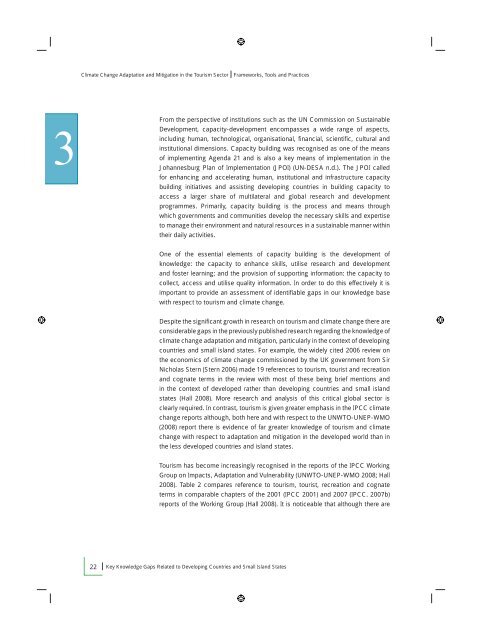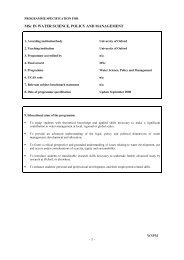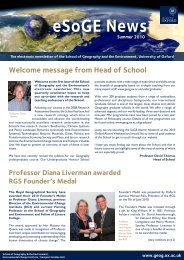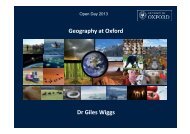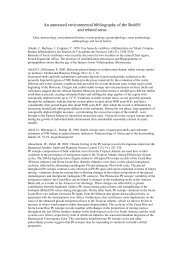Climate Change Adaptation and Mitigation in the Tourism Sector
Climate Change Adaptation and Mitigation in the Tourism Sector
Climate Change Adaptation and Mitigation in the Tourism Sector
You also want an ePaper? Increase the reach of your titles
YUMPU automatically turns print PDFs into web optimized ePapers that Google loves.
3<br />
<strong>Climate</strong> <strong>Change</strong> <strong>Adaptation</strong> <strong>and</strong> <strong>Mitigation</strong> <strong>in</strong> <strong>the</strong> <strong>Tourism</strong> <strong>Sector</strong> Frameworks, Tools <strong>and</strong> Practices<br />
From <strong>the</strong> perspective of <strong>in</strong>stitutions such as <strong>the</strong> UN Commission on Susta<strong>in</strong>able<br />
Development, capacity-development encompasses a wide range of aspects,<br />
<strong>in</strong>clud<strong>in</strong>g human, technological, organisational, fi nancial, scientifi c, cultural <strong>and</strong><br />
<strong>in</strong>stitutional dimensions. Capacity build<strong>in</strong>g was recognised as one of <strong>the</strong> means<br />
of implement<strong>in</strong>g Agenda 21 <strong>and</strong> is also a key means of implementation <strong>in</strong> <strong>the</strong><br />
Johannesburg Plan of Implementation (JPOI) (UN-DESA n.d.). The JPOI called<br />
for enhanc<strong>in</strong>g <strong>and</strong> accelerat<strong>in</strong>g human, <strong>in</strong>stitutional <strong>and</strong> <strong>in</strong>frastructure capacity<br />
build<strong>in</strong>g <strong>in</strong>itiatives <strong>and</strong> assist<strong>in</strong>g develop<strong>in</strong>g countries <strong>in</strong> build<strong>in</strong>g capacity to<br />
access a larger share of multilateral <strong>and</strong> global research <strong>and</strong> development<br />
programmes. Primarily, capacity build<strong>in</strong>g is <strong>the</strong> process <strong>and</strong> means through<br />
which governments <strong>and</strong> communities develop <strong>the</strong> necessary skills <strong>and</strong> expertise<br />
to manage <strong>the</strong>ir environment <strong>and</strong> natural resources <strong>in</strong> a susta<strong>in</strong>able manner with<strong>in</strong><br />
<strong>the</strong>ir daily activities.<br />
One of <strong>the</strong> essential elements of capacity build<strong>in</strong>g is <strong>the</strong> development of<br />
knowledge: <strong>the</strong> capacity to enhance skills, utilise research <strong>and</strong> development<br />
<strong>and</strong> foster learn<strong>in</strong>g; <strong>and</strong> <strong>the</strong> provision of support<strong>in</strong>g <strong>in</strong>formation: <strong>the</strong> capacity to<br />
collect, access <strong>and</strong> utilise quality <strong>in</strong>formation. In order to do this effectively it is<br />
important to provide an assessment of identifi able gaps <strong>in</strong> our knowledge base<br />
with respect to tourism <strong>and</strong> climate change.<br />
Despite <strong>the</strong> signifi cant growth <strong>in</strong> research on tourism <strong>and</strong> climate change <strong>the</strong>re are<br />
considerable gaps <strong>in</strong> <strong>the</strong> previously published research regard<strong>in</strong>g <strong>the</strong> knowledge of<br />
climate change adaptation <strong>and</strong> mitigation, particularly <strong>in</strong> <strong>the</strong> context of develop<strong>in</strong>g<br />
countries <strong>and</strong> small isl<strong>and</strong> states. For example, <strong>the</strong> widely cited 2006 review on<br />
<strong>the</strong> economics of climate change commissioned by <strong>the</strong> UK government from Sir<br />
Nicholas Stern (Stern 2006) made 19 references to tourism, tourist <strong>and</strong> recreation<br />
<strong>and</strong> cognate terms <strong>in</strong> <strong>the</strong> review with most of <strong>the</strong>se be<strong>in</strong>g brief mentions <strong>and</strong><br />
<strong>in</strong> <strong>the</strong> context of developed ra<strong>the</strong>r than develop<strong>in</strong>g countries <strong>and</strong> small isl<strong>and</strong><br />
states (Hall 2008). More research <strong>and</strong> analysis of this critical global sector is<br />
clearly required. In contrast, tourism is given greater emphasis <strong>in</strong> <strong>the</strong> IPCC climate<br />
change reports although, both here <strong>and</strong> with respect to <strong>the</strong> UNWTO-UNEP-WMO<br />
(2008) report <strong>the</strong>re is evidence of far greater knowledge of tourism <strong>and</strong> climate<br />
change with respect to adaptation <strong>and</strong> mitigation <strong>in</strong> <strong>the</strong> developed world than <strong>in</strong><br />
<strong>the</strong> less developed countries <strong>and</strong> isl<strong>and</strong> states.<br />
<strong>Tourism</strong> has become <strong>in</strong>creas<strong>in</strong>gly recognised <strong>in</strong> <strong>the</strong> reports of <strong>the</strong> IPCC Work<strong>in</strong>g<br />
Group on Impacts, <strong>Adaptation</strong> <strong>and</strong> Vulnerability (UNWTO-UNEP-WMO 2008; Hall<br />
2008). Table 2 compares reference to tourism, tourist, recreation <strong>and</strong> cognate<br />
terms <strong>in</strong> comparable chapters of <strong>the</strong> 2001 (IPCC 2001) <strong>and</strong> 2007 (IPCC. 2007b)<br />
reports of <strong>the</strong> Work<strong>in</strong>g Group (Hall 2008). It is noticeable that although <strong>the</strong>re are<br />
22 Key Knowledge Gaps Related to Develop<strong>in</strong>g Countries <strong>and</strong> Small Isl<strong>and</strong> States


